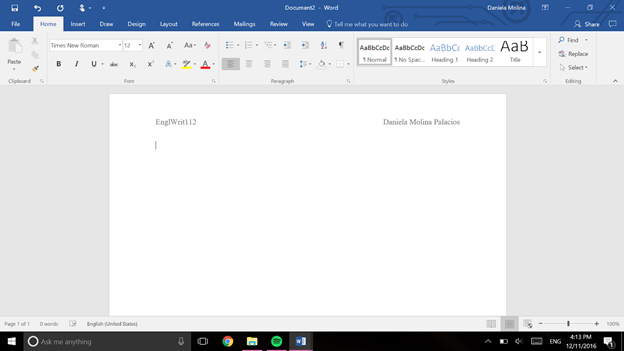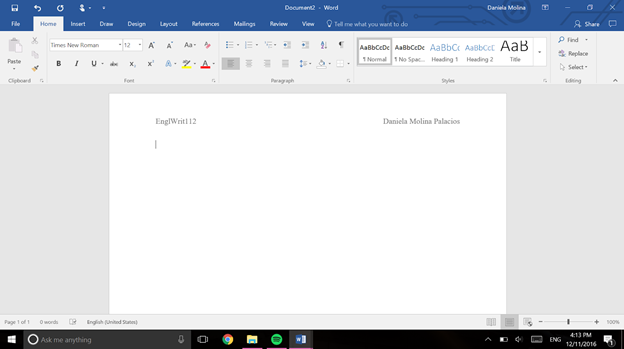6 The Writing Process of a Nonwriter
Daniela Molina Palacios
Click to listen to this essay
This essay explores the ENGLWRIT 112: College Writing journey of a self-proclaimed “nonwriter.” The author, convinced of their inability to write, narrates the story of their gradual transformation, through the many small and big things they learn in this course. The essay’s subtle humor and tender conclusion, along with its strategic use of images, attest to the miles traversed by this nonwriter in the course of the semester.
Daniela Molina Palacios
Instructor
ENGLWRIT 112: College Writing
Day Month Year
The Writing Process of a Nonwriter
| CLASS | SCHEDULE |
| ENGLWRIT 112-027 | MoWeFr 10:10AM-11:00AM |
| LEC (71900) | French Hall Room 102 |
I dreaded looking at my schedule.
You must know one thing about me reader, and that is I am not a writer.
All I knew about writing was from all my poorly written history and literature papers in high school. I knew enough to know I was not good, so everything I wanted was for me to make it through the course with my GPA intact. If I couldn’t manage a simple high school paper written in my own language, how was I supposed to write a college level essay in a foreign language?
On the first day of class, I stumbled into the room and sat in the front. I was (probably) trying to show that I was genuinely interested in the class, so any piece of poor writing that I would be turning in during the semester was not the product of a last-minute, panic-induced work, but my actual best. The class went by and I couldn’t stop staring at the assignment sheet that was just given to me. Not only did I have to write, but I had to write about myself. What was I supposed to write about?
After pushing it off as much as I could, I finally opened Microsoft Word. It started just as any other of my writing assignments:

I must confess to you reader, it stayed like that for more hours than you could imagine. For a nonwriter like me, a blank page is not an opportunity, it is something to be frightened of. Eventually, when I finally started typing, it went like this:





For hours, I stared at the blank Word document. All my thoughts were trapped in my head and I thought it was because I didn’t know how to write. Eventually, I found out later it was because I thought that every word and sentence I wrote needed to be perfect. Still, I somehow managed to finish my first draft and I still vividly remember how nervous and anxious I was about people reading it. Usually, I write the essay and turn it in to the professor. Done.
It didn’t go like that this time.
Peer responses, comments, advices, all different ways to edit my essay. For the first time, I had to review my writing, my word choices, the formatting and so on. Looking at my final draft of my first essay, I finally understood that writing is not a simple action of pouring words in a Word sheet but a process of reviewing and reflecting of the message one wants to transmit. For the first time, while looking forward and back from my first and final draft, I felt something different than mortified about my writing: I felt proud. Don’t get me wrong reader, my essay was still bad but it had improved. I had improved it.
Before this course, I used to think this is how writing was supposed to be:
- Have something to write about.
- Write it.
- Awesome piece of writing.
However, in this class my writing process was more like this:
- Open Spotify and play favorite playlist
- Open Microsoft Word
- Think of what to write about
- Keep thinking
- Start typing thoughts
- Finish first draft
- Feel mortified about how badly it looks
- Revise first draft
- Edit first draft
- Revise edited draft
- Edit the edited draft
- Realize it is worse (sometimes)
- Edit again
- Turn in Final draft
After understanding that every piece of writing is not supposed to be good, much less perfect, on the first attempt, I had an easier time writing my papers. I took every chance to experiment with different formats and topics. However, I still dreaded a blank page. I still got caught up rethinking every word I type. You may not realize this reader, so far this is my fourth attempt at writing this assignment, and we are still halfway through. However, I need to remind myself that this paragraph may not even make it to the final draft, and that’s the beauty of it. I find freedom in that – the freedom of putting my thoughts to ephemeral words.
What makes one a writer? People say that everyone is a writer. Am I a writer? It is true that anyone can be a writer, but trust me reader, I do not feel like one. Throughout this course, I learned to use words in my favor rather than against me, as I used to think of them. The portfolio that I am most proud of is the one that I made personal. For unit three, I committed, for the first time, my thoughts to writing. I remember that once I started typing, I couldn’t stop. While playing my favorite playlist in the confidentiality of my room, I stopped thinking about the audience as my enemies but rather how to reach to them and deliver my message. Obviously, it required a substantial revising but I was surprised when I saw the reaction it generated from my audience.
“Your tone is passionate”
“I love how powerful you made this”
It certainly made a difference with my previous essay (Unit Two), in which I distanced myself from my academic audience, perhaps scared. With this, I learned that writing is personal, and that even I can express my thoughts, ideas, and experiences through it.
Maybe I am a writer… probably not the most brilliant one, but a writer.
So reader, this whole essay has been in vain if you do not understand the following:
I know you might still feel insecure about writing down your thoughts, but please don’t let that stop you. Remember that words can be easily erased so don’t fear them. Writing is a process, a messy one, and there is always room for improvement. You probably have something to say, and you will say it, just find the right words, keep typing, and most importantly, don’t be afraid.

